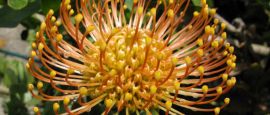Madeira History, Language and Culture
History of Madeira
When the Portuguese patron of exploration, Prince Henry 'the Navigator', gathered together the finest cartographers early in the 15th century, his plan was to extend the country’s collective knowledge of the coast of West Africa.
He enlisted the services of two young captains, João Gonçalves Zarco and Tristão Vaz Teixeira, who were blown off course on their journey. After many days at sea they found land in the form of a small island which they named Porto Santo. On reporting to their prince, they were promptly ordered to return and colonise the island. The year was 1419.
Today, it seems incredible that it took a further year before the discovery of the much larger island of Madeira was made. The captains had reported a dark mass of clouds visible on the southern horizon, and were encouraged to explore further afield.
As they approached, the huge Atlantic rollers breaking along the north coast and the turmoil of the currents at Ponta de São Lourenço would have done nothing to subdue the anxieties of the superstitious sailors. But on rounding the headland they discovered the bay of Machico, the gateway to the densely forested island that they named Madeira – the name means 'wood'. Prince Henry immediately organised the colonisation of the island.
Sugarcane became the main driver for economic growth in the 15th and 16th century. Early settlers found the island’s climate perfect for cultivating this cash crop, which was harvested using slave labour. When the sugar industry migrated to South America, wine became the main industry.
Portugal briefly lost control of the islands when the British occupied them during the Napoleonic Wars. However, they were somewhat reluctantly handed back to the Portuguese in 1814, who governed them until the Carnation Revolution of 1974. Since then Madeira has enjoyed political autonomy from the mainland.
Did you know?
• Former British Prime Minister Winston Churchill was a regular visitor to the fishing village of Camara de Lobos, which he liked to paint.
• Christopher Columbus married Filipa Moniz on the Madeira archipelago in 1478 – sadly, she died a short time later giving birth to their son.
• The effects of WWI on Portugal were first felt in Funchal, which was shelled for two hours by German U-boats in 1916.




 You know where
You know where